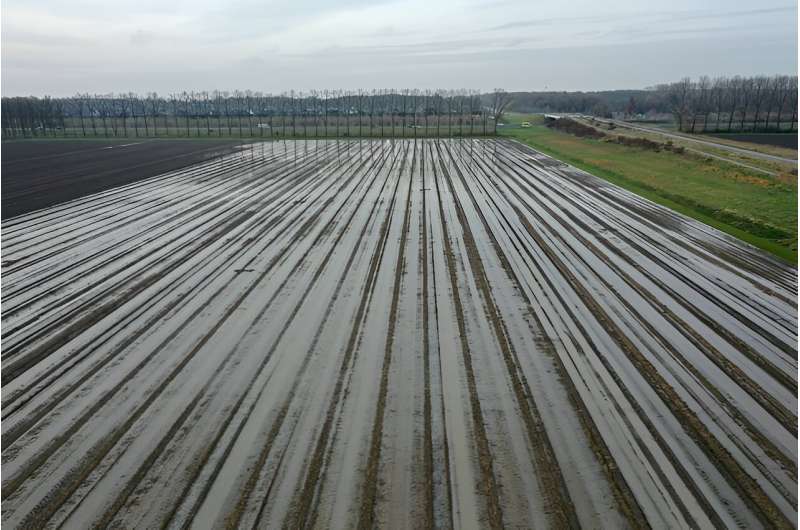This article has been reviewed according to Science X's editorial process and policies. Editors have highlighted the following attributes while ensuring the content's credibility:
fact-checked
trusted source
proofread
Dutch farmers struggle through extreme weather

The sub-zero temperatures have a detrimental effect on crops that were prevented from being harvested due to the extreme precipitation in recent months. Potatoes still in the fields in January are to be considered lost. Wijnand Sukkel of Wageningen University & Research says, "Farmers deal with increasingly extreme weather. WUR seeks solutions in lighter farming machinery and breeding varieties that are more resilient against extreme weather."
Climate change causes drought, extreme heat, extreme summer precipitation, and wetter winters. The soil in several locations is saturated to the extent that it cannot support the weight of harvesting equipment, nor can it be prepared for sowing. An estimated five to ten percent of the potato, carrot, and sugar beet harvest is still in the ground. Grain farmers have been unable to sow winter grain.
"The wet spring last year delayed the planting of potato and sugarbeet crops, and when the time came to harvest, the soil was, once again, drenched," says Wijnand Sukkel, a researcher of sustainable agriculture.
"The heavy harvesting combines get stuck in the mud. This, and the amount of water in the ground, adversely affects soil structure. The air is pushed out of the soil, which jeopardizes the crops. Due to compaction, water can no longer infiltrate the soil, which will only worsen the problem in the coming years."
The heavy rainfall has been on everyone's minds, says Eric Poot, Team Leader at WUR Greenhouse Horticulture and Flower Bulbs. Spring-flowering bulbs, such as tulips, were planted later due to the persistent rainfall and are under stress from the elevated water levels. This may cause a disappointing harvest in the summer. "Moreover, growers are worried about autumn-flowering plants. The lilies are still in the ground in several places, and bulbs have already perished."
Farmers and growers have options should the future remain this wet. Wijnand Sukkel is studying a system of fixed tracks on the Farm of the Future and the use of lighter machinery with caterpillar treads. This will enable farmers to work on the land without causing it to compact.
"Farmers may also consider planting a potato variety that is ready for harvesting earlier in the season," Sukkel suggests. "However, the processing industry -which makes fries, chips, and starch- must cooperate. Moreover, water authorities play a part in finding the correct balance between draining and retaining sufficient water in the area."
WUR also seeks solutions in crop breeding. Gerard van der Linden, a breeding expert, explains that periods of heavy precipitation occur with increasing frequency. "To address drought, we are developing varieties that are more efficient in their water usage," he explains.
"However, plants becoming submerged for days on end is an entirely different issue. The oxygen levels in the soil become depleted, and the crops become damaged. Breeding varieties that go into hibernation may be an option. Rice is an example of such a crop. This plant lowers its metabolism when water levels rise. The plant no longer requires oxygen and 'holds its breath,' as it were. However, a plant can only maintain this for a limited time."
Gerard van der Linden says that if rot affects bulbs or tubers, you can breed varieties that are more resilient against fungi or have thicker skin. "Farmers must be able to sell their crops. Hence, consumers and merchants must be on board. And developing or modifying varieties takes time. Depending on the crop, it may take between three and ten years." Eric Poot adds, "Breeding tulips takes over twenty years."
Sukkel thinks the situation in the arable farming sector will remain manageable as long as farmers have the proper soil structure. "Compaction occurs frequently in soil used for maise and grass. This is a problem that is often underestimated, while a proper soil structure is important for these crops as well to achieve a good harvest."
Eric Poot adds, "At present, I am not very worried about the economic potential of bulb farming, production is high, and a slight drop may even benefit the market. But the winters must not stay this wet year after year."
Provided by Wageningen University




















